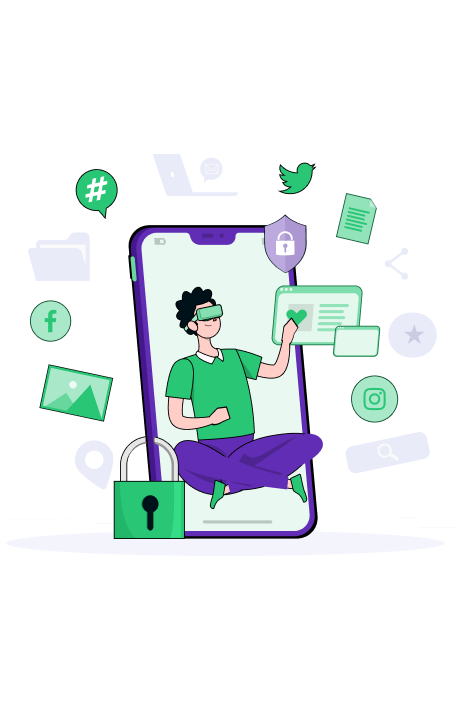
Securing your accounts and protecting your privacy
In today’s digital age, maintaining a private and secure online presence can be challenging. It’s not just limited to social media platforms, as other apps also collect user data for various purposes. For instance, Zoom may use your LinkedIn profile data to display your name and profession during a video call. Strava, a fitness app, had previously recorded the routes of its users, inadvertently revealing sensitive US military information. Even Facebook has been known to allow certain employees access to user passwords stored in their database.
However, it’s not impossible. There are a few measures that can protect your privacy, secure your identity and limit the amount of data that other companies collect from you. The skill of browsing in a protected environment is a valuable skill that everyone should learn. Follow our detailed guideline to protect your privacy and make your accounts secure.
What is online privacy?
Before we delve into security protection, it’s crucial to understand what online privacy entails. Online privacy refers to the ability to control the information you share on social platforms. This information may include photos, videos, or posts shared on platforms such as Snapchat, Facebook, or Instagram. On the other hand, cybersecurity focuses on protecting users’ privacy from illegal data collection by hackers.
Ensuring online privacy is a top concern for every organization, and they are continually updating their online privacy policies to protect users’ rights. While some tech departments are focused on protecting privacy and enforcing laws, others may be circumventing laws and using user data for their own purposes.
How to secure your accounts and protect your privacy
Although there are a lot of ways to protect your account and enhance your privacy, some of the major steps are:
- Share less information on social media: Sharing personal news and updates on social media is a common practice, but it’s important to be aware of potential risks associated with oversharing. Stalkers and cybercriminals can use this information to gain access to your personal data, which they may misuse or sell to other companies. To limit the data you share, it’s a good idea to skip sharing optional information such as your middle name or phone number. Additionally, creating a separate email address to use for subscriptions and online purchases can help keep your personal email address private and reduce the amount of unsolicited messages you receive.
- Secure your passwords: Use strong passwords for all your accounts and avoid using the same one for all your accounts. It’s good to put a two-way authentication passcode on all your accounts. For two-way authentication, the use of SMS code is not over safe and the app authenticator is more reliable. Secure your WiFi password as your router has pretty huge data for collection.
- Auto-lock your phone: Use the auto-lock feature on your devices. If your phone has facial recognition or fingerprint features, put your phone lock on automatic lock after every 30 seconds or lock immediately.
- Privacy control on devices: Take a look at your devices’ privacy settings. If you are an android user go to google activities and turn off your activity history and delete every data you see. Of course, you can back up your photos and videos but delete random audio recordings, location history, and so on.
- Remove unused apps and browser extensions: Free apps and browser extensions monitor your activities and steal your data from other companies to generate their revenue. Eight extensions were reported that were stealing user data from users’ online activities. So, it’s always good to remove free or unused extensions.
- Hide your browsing activities: Use an incognito window to browse sensitive data like banking transactions to avoid traces of sensitive data from data leakage or security breaches.
- Use a VPN: The best way to secure your accounts and protect your privacy is to browse through a VPN.
- Software updates: Update the software and use up-to-date browsers as the newly updated software resolves the security breaches and updates it to prevent data theft.
Importance of securing your account
There is a lot of importance in securing your account as privacy leakage can damage your reputation on social media. Here are a few damages that might cause you if someone misuses your data:
- Using someone else’s profile picture and name to post inappropriate content can damage their online reputation and have long-lasting consequences.
- Employers often search for candidates online and may reject those with negative social media profiles, making it crucial to maintain a positive online presence.
- Hackers may use private photos and videos for their own gain, which can lead to identity theft and other criminal activities.
Conclusion
Online security is of utmost importance in today’s digital age. The risk of data breaches is not only financially damaging but can also be life-threatening. In some cases, hackers may use stolen personal information to blackmail users and demand money or other favors. This can lead to extreme stress and anxiety, and in some cases, even push the victim to consider ending their own life.
It’s important to take proactive steps to secure your online accounts and personal information. This includes using strong and unique passwords, enabling two-factor authentication, regularly updating software and security patches, and being cautious about sharing personal information online.